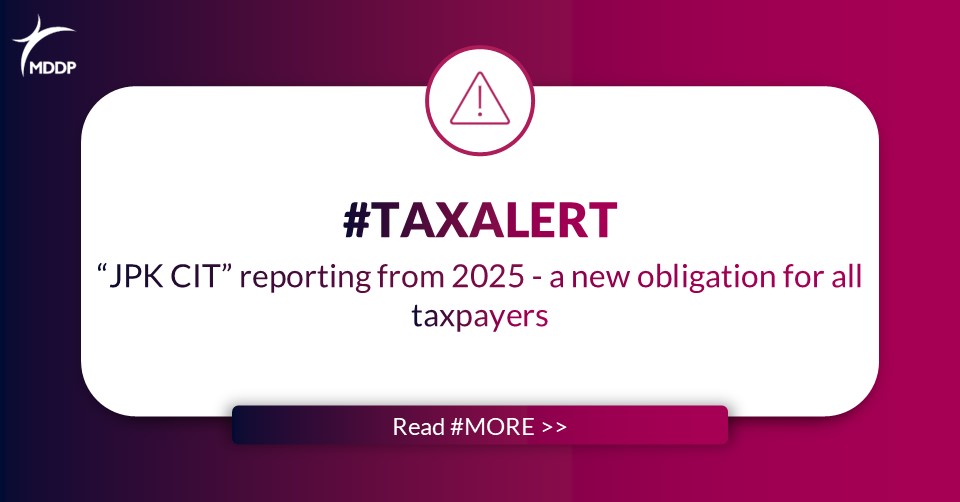“JPK CIT” reporting from 2025 - a new obligation for all taxpayers
On August 16, 2024, the Minister of Finance signed a regulation regarding the details of JPK CIT reporting. It is to be formally published in the near future.
JPK CIT is a new obligation regarding the transfer of data from accounting books to tax offices. It includes 2 schemas:
- JPK_KR_PD – uniform control file_accounting books_income tax (in practice, it includes all records from accounting books, turnover and balance statement with ministry markers for accounts and data on tax revenues and costs);
- JPK_ST_KR – uniform control file_fixed assets_accounting books (in practice, it includes tax and balance sheet records of fixed assets, details regarding depreciation and information on the acquisition/production/disposal/liquidation of fixed assets).
New obligations for CIT taxpayers will be implemented according to the following schedule
for tax years starting after:
- December 31, 2024 in the case of tax capital groups and CIT taxpayers whose revenue value in the previous tax year exceeded EUR 50 million,
- December 31, 2025 in the case of other CIT taxpayers required to submit JPK_VAT records;
- December 31, 2026 in the case of other CIT taxpayers.
Data subject to reporting may contain additional information that has not been recorded so far, e.g. tax number of contractors and the VAT (“KSeF”) number for invoices. For reporting for the first period (2025), temporary exemptions are provided for reporting certain data (as part of the adjustment period for taxpayers). As a result, an element of preparation for JPK CIT may be an update of accounting software, including one that allows for generating files with the required markers.
Preliminary activities should also include updating the chart of accounts and training accounting departments. It may be good practice to generate a sample file and conduct a tax audit based on it in terms of potential risks. As a result, it will be possible to identify risky items and introduce appropriate changes before the start of the tax year for which the first JPK CIT will be required.
As to fixed asset records, it is recommended to verify existing entries and update the policy/practice related to the settlement of purchases or settlement of investments. The subject of reporting will also be “old” fixed assets. After fulfilling this obligation for the first period, taxpayers will lose the possibility of ad hoc corrections in the records (e.g. names of fixed assets) or such changes will be subject to additional risk.
Similar obligations will also apply to PIT taxpayers (at least in terms of tax revenues and costs) – the first group for 2026. The Ministry has not yet published a draft regulation or scheme.
The MDDP and MDDP Outsourcing team offers comprehensive support in the implementation of JPK CIT obligations, including the verification of charts of accounts, fixed asset records and accounting methods. We also cooperate with IT service providers in the field of tools supporting JPK CIT settlement from the technological side.
If you have any questions, please contact:
| Rafał Kran | rafal.kran@mddp.pl | +48 693 290 919 |
or your advisor from MDDP.
This Tax Alert does not constitute legal or tax advice. MDDP Michalik Dłuska Dziedzic i Partnerzy spółka doradztwa podatkowego spółka akcyjna is not responsible for the use of the information contained in the Alert without prior consultation with legal or tax advisers.

